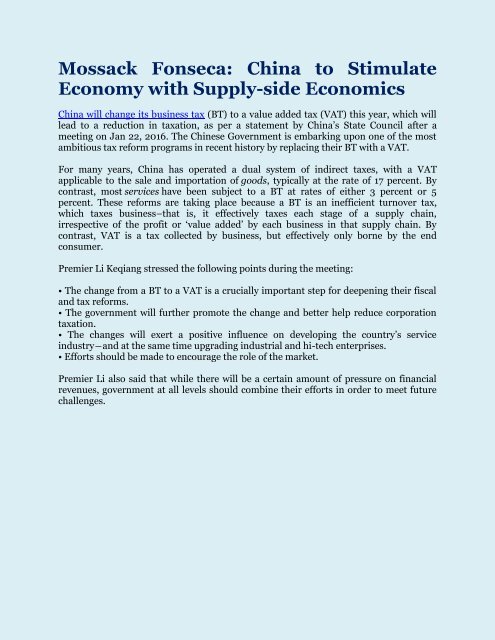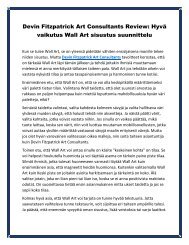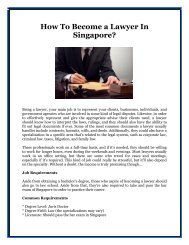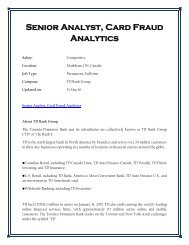Mossack Fonseca: China to Stimulate Economy with Supply-side Economics
China will change its business tax (BT) to a value added tax (VAT) this year, which will lead to a reduction in taxation, as per a statement by China’s State Council after a meeting on Jan 22, 2016. The Chinese Government is embarking upon one of the most ambitious tax reform programs in recent history by replacing their BT with a VAT.
China will change its business tax (BT) to a value added tax (VAT) this year, which will lead to a reduction in taxation, as per a statement by China’s State Council after a meeting on Jan 22, 2016. The Chinese Government is embarking upon one of the most ambitious tax reform programs in recent history by replacing their BT with a VAT.
You also want an ePaper? Increase the reach of your titles
YUMPU automatically turns print PDFs into web optimized ePapers that Google loves.
<strong>Mossack</strong> <strong>Fonseca</strong>: <strong>China</strong> <strong>to</strong> <strong>Stimulate</strong><br />
<strong>Economy</strong> <strong>with</strong> <strong>Supply</strong>-<strong>side</strong> <strong>Economics</strong><br />
<strong>China</strong> will change its business tax (BT) <strong>to</strong> a value added tax (VAT) this year, which will<br />
lead <strong>to</strong> a reduction in taxation, as per a statement by <strong>China</strong>’s State Council after a<br />
meeting on Jan 22, 2016. The Chinese Government is embarking upon one of the most<br />
ambitious tax reform programs in recent his<strong>to</strong>ry by replacing their BT <strong>with</strong> a VAT.<br />
For many years, <strong>China</strong> has operated a dual system of indirect taxes, <strong>with</strong> a VAT<br />
applicable <strong>to</strong> the sale and importation of goods, typically at the rate of 17 percent. By<br />
contrast, most services have been subject <strong>to</strong> a BT at rates of either 3 percent or 5<br />
percent. These reforms are taking place because a BT is an inefficient turnover tax,<br />
which taxes business–that is, it effectively taxes each stage of a supply chain,<br />
irrespective of the profit or ‘value added’ by each business in that supply chain. By<br />
contrast, VAT is a tax collected by business, but effectively only borne by the end<br />
consumer.<br />
Premier Li Keqiang stressed the following points during the meeting:<br />
• The change from a BT <strong>to</strong> a VAT is a crucially important step for deepening their fiscal<br />
and tax reforms.<br />
• The government will further promote the change and better help reduce corporation<br />
taxation.<br />
• The changes will exert a positive influence on developing the country’s service<br />
industry―and at the same time upgrading industrial and hi-tech enterprises.<br />
• Efforts should be made <strong>to</strong> encourage the role of the market.<br />
Premier Li also said that while there will be a certain amount of pressure on financial<br />
revenues, government at all levels should combine their efforts in order <strong>to</strong> meet future<br />
challenges.









